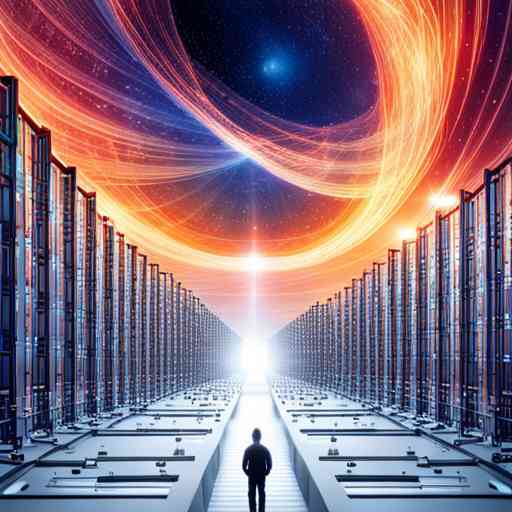When Space Calculates: A Journey into Digital Physics
 In our continuous search for understanding the universe, we've come up with many different models and theories, ranging from the intricate dances of celestial bodies in the heavens to the infinitesimally small subatomic particles. However, some scientists argue that there might be a radically different approach to comprehend the cosmos: Digital Physics.
In our continuous search for understanding the universe, we've come up with many different models and theories, ranging from the intricate dances of celestial bodies in the heavens to the infinitesimally small subatomic particles. However, some scientists argue that there might be a radically different approach to comprehend the cosmos: Digital Physics.
Digital Physics is a collection of theories that propose that the universe, at its most fundamental level, operates like a giant computer. It's a vision where the universe's physical laws and constants, from gravity to the speed of light, are no different than algorithms being run by the cosmic processor.
One of the pioneers of this bold and intriguing idea is Konrad Zuse, a German computer scientist and inventor, famous for creating the world's first programmable computer. Zuse presented his thoughts about the universe's computational nature in his 1969 book, "Rechnender Raum," translated as "Calculating Space."
The Calculating Cosmos
In "Calculating Space," Zuse proposes that the entire universe is essentially a computer, constantly performing calculations that determine the behavior of every particle, every star, and every galaxy. This concept of a "cellular automaton" forms the backbone of his theory, where each part of the universe computes its next state based on its current state and the state of its neighbors.
If you imagine the universe as a three-dimensional grid of tiny "cells," each cell is like a tiny processor that is continuously crunching numbers and communicating with its neighbors. This relentless calculation and information exchange underlie everything from the flow of a river to the spin of an electron.
Redefining Reality
Digital Physics, and Zuse's cellular automaton theory, has profound implications for our understanding of reality. If the universe is a grand calculation, then the laws of physics are essentially software instructions, and the fundamental particles are bits of information. It means that everything we experience is a result of the universe 'running' its cosmic code.
Although it might sound like science fiction, there's a growing body of evidence that suggests that the universe does behave in ways that are strikingly similar to a computer. Quantum physics, for instance, describes the behavior of particles in ways that can be framed in terms of information processing.
Moreover, the idea of the universe as a computation provides a potential explanation for why the laws of physics often have a mathematical beauty and elegance to them. It could be because they're actually algorithms, inherently mathematical constructs, being executed on the grandest scale imaginable.
Future Perspectives and Challenges
Despite its compelling nature, the digital physics approach is not without its challenges. One major obstacle is the difficulty of providing empirical evidence. While certain phenomena, especially in quantum physics, can be interpreted in terms of computation, proving that the universe is inherently computational is another matter entirely.
Furthermore, the sheer scale and complexity of the computations the universe would be performing pose a significant challenge. With each particle interacting with every other particle, the amount of computation required would be unimaginably large.
The Cosmic Computation
In conclusion, Zuse's vision of a "Calculating Space" is a bold and exciting idea that takes us down a fundamentally different road to understanding the cosmos. The universe as a vast computation, with its laws as software and its particles as data, is a perspective that offers new insights and possibilities.
While there are many challenges and uncertainties to overcome, one thing is certain: Digital physics and the idea of a calculating universe are pushing the boundaries of our scientific imagination, encouraging us to rethink our concepts of reality. Whether we ultimately prove this vision correct or not, it's a journey that will undoubtedly deepen our understanding of the cosmos in which we live.
As we continue exploring and unlocking the mysteries of the universe, it's thrilling to think that we might be living in a grand cosmic computation, a notion that offers a fresh and fascinating lens through which to gaze upon the stars.